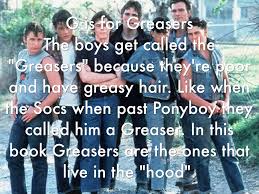S.E Hinton (2000 [1967]) The Outsiders
Posted by celticman on Tue, 30 Aug 2016

It’s almost fifty years since The Outsiders was published. ‘The Original Teenage Rebel Story’ proclaims the tag on the cover. I’m sure William Shakespeare’s Romeo and Juliet had the same banner headline, but in yeh olde worlde English. Hinton was only seventeen when she wrote it. And like fourteen-year old Ponyboy, the first-person narrator, you can imagine her trying to impress her English teacher and scrape a better grade by turning a suggested five page exercise into a 218 pages of prose and a coming-of-age story that shows how American society is prejudiced against the poor and it’s rules and regulations favour the rich. A* for effort Ms Hilton.
Ponyboy is a ‘greaser’, his hair is ‘longer than a lot of boys. Most greasers ‘rarely bother to get a haircut’ and the grease their hair. East side is where the greasers live and hang out. ‘Greasers are almost like hoods, we steal things and drive old souped up cars’. The Socs go to the same school but live on the West side and drive ‘tuff’ cars and wear ‘tuff’ clothes such as blue madrass shirts, but don’t have a tough life. Ponyboy is philosophical about the class differences, ‘I’m not saying that either Socs or greasers are better; that’s just the way things are’. Greasers pride themselves on how tuff and tough they are and stick together. And Socs do the same. When they meet in a rumble it’s the greasers that cop the blame, but they won’t back down, not for anybody.
Plotting is a big hitter. Bob the bully Soc, for example who busted up Johnny, the greaser, early in the narrative later pays a high price. Johnny knives and accidentally kills him trying to protect Ponyboy who’s being beaten up and half drowned, but Johnny finds redemption by breaking his back, being badly burned and setting the world to rights, before melodramatically dying saving some wee boys that are trapped in a derelict church that is burning down around their heads. In turn that drives a fellow greaser, super tuff Dally, who looked out for little Johnny, over the edge. Death by cop, which has a familiar ring to it.
Ponyboy explains it to himself and to the reader in a simple way. ‘Dally Watson wanted to be dead and he always got what he wanted.’
There are no blacks in the novel and it’s a male world with girls adding little more than decoration. It’s family that counts most. And with his mum and dad killed in an autowreck, Ponyboy acknowledges how hard it is for Darry, his twenty-year old brother, who works two jobs, to keep the family together. Happy-go-lucky Soda, who is sixteen, has dropped out of school, but is happy working in a garage. He adds to a choir of voices that demand something different from Ponyboy. Twobit, one of their friends, for example, acknowledges that to be a greaser demands that ‘you get tough and you don’t get hurt’. But for Ponyboy this translates differently. He demands that he get on and get out, give them something to be proud of. ‘Get smart and nothing can touch you.’
Hinton’s veiled coda is education is the route out of the greaser ghetto. That truth did hold true at that time, but like the idea that Bob the bully’s parents loved him too much and let him away with too much and if they’d loved him less and thrashed him more he wouldn’t have turned out the way he was and wouldn’t have died—well, these are ideas of a certain epoch. The American dream of working hard and playing hard and the world playing fair with you, died right there and then, at the cusp end of the sixties. Since then the tuffs are The Socs of society who have pretty much wiped the floor with the greasers in society. A sad but simple truth a rule for the rich and a rule for the poor, but as Ponyboy knows who rules and we don’t want sympathy, we just want to get even.
As Randy explains. ‘You can’t win, even if you whip up. You’ll still be where you were before – at the bottom’.
Yep, that sounds about right. Roll on super-tuff Reagan and Soc it to the rest of us greaser chumps.
- celticman's blog
- Log in to post comments
- 3812 reads


